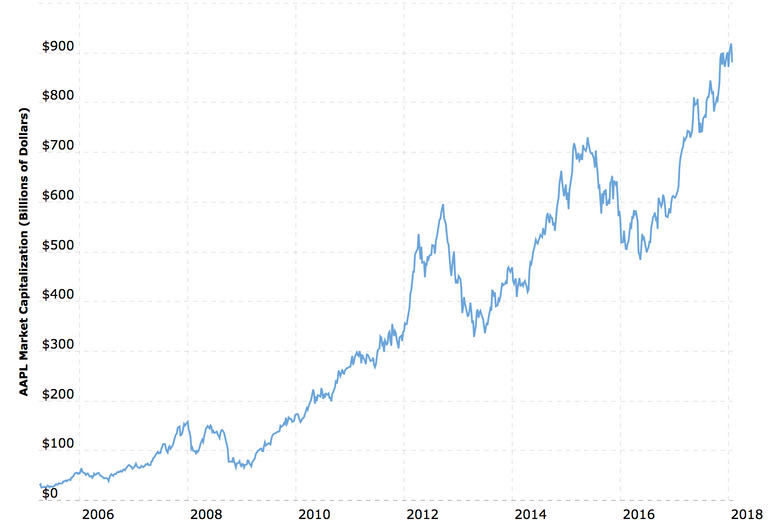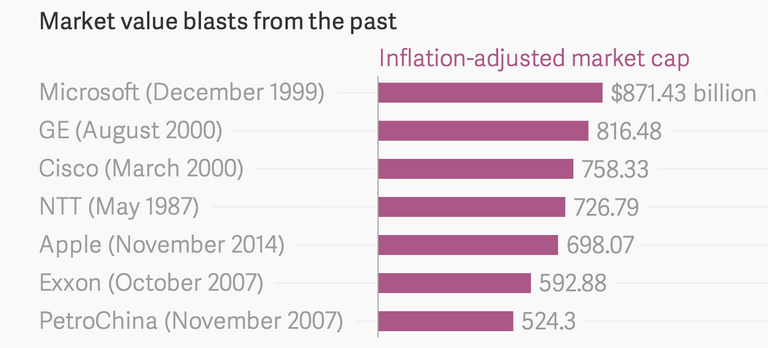
Market Capitalization
In Crypto, the market cap argument is a hotly debated topic. If you have been around for more than a day you are bound to have come across someone who will argue btc, eth, xrp or any other coin you can imagine will never have a market cap of (insert number here). What is the reality of the situation? Is there really a logical answer to the above question? Lets dive right in and find out.
It is easy for anyone out there to reach right to aapl better known as Apple and make a comparison. In nominal terms, Apple’s nearly $700 billion market cap is the largest ever seen on planet earth. Is everything as it appears? Is there more to the story than what is being told?
At first glance apples market cap (approx 900B) is a staggering number that currently dwarfs the entire market of the cryptosphere (approx 600B). Let's go ahead and take a look.

As you can see by the above chart Apple has achieved a very impressive feat that few companies can ever compare to.
What is interesting tho is when you dive into history you suddenly have a strikingly different picture painted for you. Let's prepare our time machines, bill and ted are waiting for us.

As you can see above when we adjust our numbers for inflation apple still has some room to grow. We have instantly put a notch into most arguments self-proclaimed "crypto market cap experts" fail to realize or acknowledge. This does not solve the puzzle but it brings up some interesting things to consider. What other pieces of this puzzle are we missing?
I would argue that history tends to dismiss the future. What do I mean by this?
the following have been taken and quoted from:
https://www.weforum.org/agenda/2016/10/10-predictions-for-the-future-that-got-it-wildly-wrong/
1903
“The horse is here to stay but the automobile is only a novelty – a fad.”
Michigan Savings Bank tried President to discourage Henry Ford’s lawyer from investing in the newly formed motor company. Horace Rackham ignored the advice and turned his $5,000 investment into $12.5 million, as cars replaced horses.
1911
“It will be an easy matter to convert a truckload of iron bars into virgin gold.” -
Thomas Edison predicted alchemy would soon be perfected, proving the great American inventor had at least one lightbulb moment that didn’t burn so brightly.
1912
“The coming of the wireless era will make war impossible because it will make war ridiculous.”
Guglielmo Marconi hoped his wireless telegraph would end the war because it enabled more open communication between nations.
1920
“A rocket will never be able to leave the Earth’s atmosphere.”
The New York Times dismisses the possibility of space travel. The paper issued a light-hearted retraction of its original article as Apollo 11 headed to the moon in 1969.
1949
“Computers in the future may have only 1000 vacuum tubes and perhaps weigh only 1.5 tons.”
Popular Mechanics magazine looked at a 30-ton calculator and dreamed of miniaturization.
1955
“Nuclear-powered vacuum cleaners will probably be a reality in 10 years.”
Alex Lewyt, President of the Lewyt vacuum company, predicts the invention of a device that few people would want to have under the stairs.
1966
The Reader’s Digest looks ahead to 1999 and sees rocket packs on our belts, flying cars and climate-controlled cities under glass domes.
1977
“There is no reason anyone would want a computer in their home.”
Ken Olsen, the founder of the Digital Equipment Corporation, appears to have missed an opportunity. Though to be fair, his computers were bigger than many people’s homes at the time.
1995
“I predict the internet will go spectacularly supernova and in 1996, catastrophically collapse.”
Robert Metcalfe invented the Ethernet cable and worried that his clever piece of wire would not be able to handle all that data.
1997
“Admit it, you’re out of the hardware game.”
Wired Magazine challenges Apple to face up to the ‘fact’ that it can’t compete with other gadget makers.
Four years later the iPod put 1000 songs in our pockets and started Apple’s path to world domination.

Where Does This Leave Us
In many of these examples, there was a company involved in a technological revolution that later blew the previous Market cap example out of the water. Other just show how the future is often overlooked by those who lack the vision.
Each of the above shows how it is easy to underestimate the future if you are unwilling to accept change and admit it is upon you.
Blockchain, in general, will be one of the biggest innovations of our lifetime and will reinvent the economy as we know it. At the current time, it is safe to assume that the economy can grow. What we do not know is what percent and how quickly it can happen as a new technological revolution is upon us. Anyone of the current cryptocurrencies that solves a real use case could quickly evolve into the next apple. If it does it is next to impossible to say where it's market cap will settle.
One blockchain solution that is currently trying to solve a real use case is RIPPLE with its XRP ecosystem. RIPPLE is trying to solve the issue of slow cross-border payments which are referred to as remittances. The remittance market is huge with the biggest player in the industry being SWIFT. SWIFT handles about $5trn each day or about 1.825 quadrillion dollars a year. While it is quite unlikely that RIPPLE captures the entire market from SWIFT it is almost certain it will take a piece of this pie. With such a huge market on the table, I guess the only question we need to answer now is can RIPPLE turn it's XRP ecosystem into the apple of the future?
Please let me know your thoughts in the comments below.

To the question in your title, my Magic 8-Ball says:
Hi! I'm a bot, and this answer was posted automatically. Check this post out for more information.